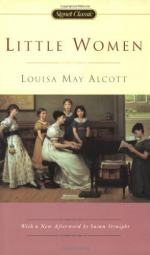It seldom is, at first, and thirty seems the end of all things to five-and-twenty. But it’s not as bad as it looks, and one can get on quite happily if one has something in one’s self to fall back upon. At twenty-five, girls begin to talk about being old maids, but secretly resolve that they never will be. At thirty they say nothing about it, but quietly accept the fact, and if sensible, console themselves by remembering that they have twenty more useful, happy years, in which they may be learning to grow old gracefully. Don’t laugh at the spinsters, dear girls, for often very tender, tragic romances are hidden away in the hearts that beat so quietly under the sober gowns, and many silent sacrifices of youth, health, ambition, love itself, make the faded faces beautiful in God’s sight. Even the sad, sour sisters should be kindly dealt with, because they have missed the sweetest part of life, if for no other reason. And looking at them with compassion, not contempt, girls in their bloom should remember that they too may miss the blossom time. That rosy cheeks don’t last forever, that silver threads will come in the bonnie brown hair, and that, by-and-by, kindness and respect will be as sweet as love and admiration now.
Gentlemen, which means boys, be courteous to the old maids, no matter how poor and plain and prim, for the only chivalry worth having is that which is the readiest to pay deference to the old, protect the feeble, and serve womankind, regardless of rank, age, or color. Just recollect the good aunts who have not only lectured and fussed, but nursed and petted, too often without thanks, the scrapes they have helped you out of, the tips they have given you from their small store, the stitches the patient old fingers have set for you, the steps the willing old feet have taken, and gratefully pay the dear old ladies the little attentions that women love to receive as long as they live. The bright-eyed girls are quick to see such traits, and will like you all the better for them, and if death, almost the only power that can part mother and son, should rob you of yours, you will be sure to find a tender welcome and maternal cherishing from some Aunt Priscilla, who has kept the warmest corner of her lonely old heart for ‘the best nevvy in the world’.
Jo must have fallen asleep (as I dare say my reader has during this little homily), for suddenly Laurie’s ghost seemed to stand before her, a substantial, lifelike ghost, leaning over her with the very look he used to wear when he felt a good deal and didn’t like to show it. But, like Jenny in the ballad . . .
She could not think it he
and lay staring up at him in startled silence, till he stooped and kissed her. Then she knew him, and flew up, crying joyfully . . .
“Oh my Teddy! Oh my Teddy!”
“Dear Jo, you are glad to see me, then?”
“Glad! My blessed boy, words can’t express my gladness. Where’s Amy?”




